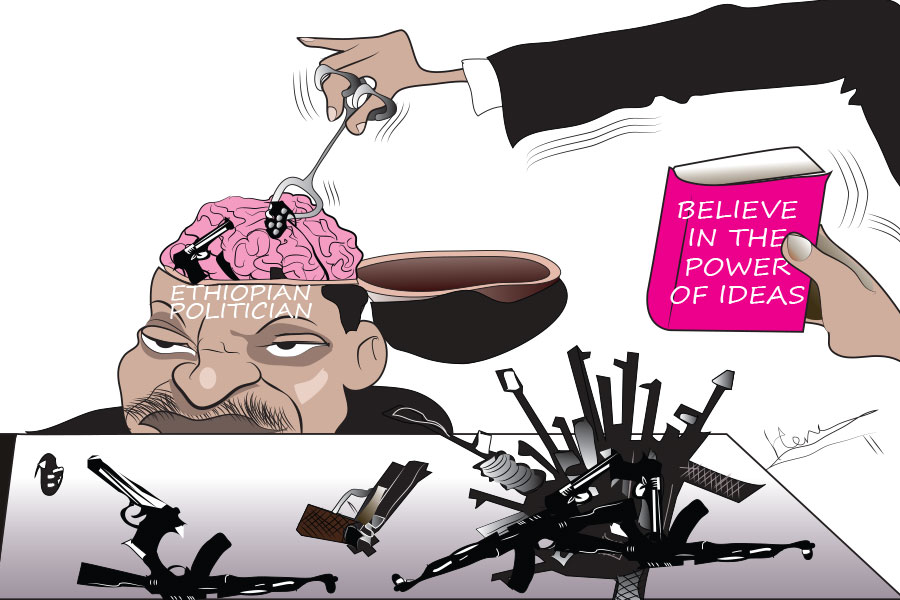
May 4 , 2019
By
Eshetu Melese performed in front of a packed audience at Gonder University during an Easter Holiday programme late last month. He stood against an eclectic assembly of students and academics to discuss issues of media professionalism, the rising cost of living and lingo-cultural diversity - all under the theme of displacement. Unsurprisingly, the young stand-up comedian made more sense and brought more substance to the discussions than the slew of political activists and commentators that have become staples of our TV screens.
Most of the political insights we get on TV have as many falsities as truths today. Eshetu Melese delivered an informed, tasteful and stylish political comedy. He seems to know where the balance lies between the contending forces of Ethiopia’s politics and what appeals to the youth.
He waded into controversial subjects like ethnic conflicts and came out of it unscathed. This, at a time when politicians can barely discuss historical, cultural and political matters without offending each other.
There is a glaring absence of political comedy in Ethiopia that can contribute to the sociopolitical maturity of the country. The fact that we have been unable to balance our history, culture and current circumstances with humor has elevated these subjects to taboos. Political discourses in the past were uninspired because of fear of prosecution. Discourses today are lacking in substance, because there are not that many who point out to the falsity and senselessness of political correctness.
Political comedy is the missing cog in the current stuffy atmosphere of pontification and lectures by the political elite. Much of the sober and insightful discussion about the current predicament is the monopoly of the few. The discussions are delivered in hushed voices, like in newspapers, and only a handful of subjects imagined to be acceptable to the incumbents are discussed.
Indeed, an informed and an articulate author, commentator or an opposition figure could do what political comedians do - hold a mirror to society. But these are elitist and their messages dry. Only someone that can entertain can grab attention, package and articulate a message that the masses can understand and care about. Political satirists and comedians are vital links between the political elite and the people.
For instance, the people are impacted by the rising cost of living in Addis Abeba. These are matters sufficiently discussed in elitist circles and at times in the media. The former though uses language that is full of jargon, while the latter is consistently crude and vague.
To hear Eshetu describe it is to look at the matter in a wholly fresh perspective. He describes a youth from Addis Abeba as a duck swimming in a lake. Above water, the duck may seem completely relaxed, even enjoying the swim. Below water, its webbed feet are paddling tirelessly. It is all a facade, he says, and the image of youth in Addis Abeba as entitled is horribly misguided, he suggests.
“An Addis Abeba youth looks kempt, because he is working on image building,” he said. “Because there is no one to build him a house.”
This is the perspective and articulation of our economic and political dilemmas we have been starved of. It appeals to the people and informs them in a language they can understand. The average Ethiopian has a job or is going to school and has personal and social engagements. Most do not have the time to read a detailed analysis of a certain issue. All they ask for is to be informed in plain language what the issues are and their solutions.
This is especially important for the youth. Few grow up with any interest in politics. Most become acquainted with it as their economic and social contribution within the state increases. In a country where the average age is under 20, it is of great importance that the youth are informed of the sociopolitical and economic circumstances of the country early on. This is a gap that political comedy can address.
PUBLISHED ON
May 04,2019 [ VOL
20 , NO
992]

Viewpoints | Dec 29,2018

Fortune News | May 18,2019

Viewpoints | Nov 07,2020

Commentaries | Mar 14,2020

Viewpoints | Mar 23,2019

Editorial | Jul 13,2024

Agenda | Dec 19,2018

Commentaries | Jun 19,2021

Editorial | Feb 20,2021

Editorial | Jun 29,2019

My Opinion | 131674 Views | Aug 14,2021

My Opinion | 128041 Views | Aug 21,2021

My Opinion | 126002 Views | Sep 10,2021

My Opinion | 123625 Views | Aug 07,2021

Dec 22 , 2024 . By TIZITA SHEWAFERAW
Charged with transforming colossal state-owned enterprises into modern and competitiv...

Aug 18 , 2024 . By AKSAH ITALO
Although predictable Yonas Zerihun's job in the ride-hailing service is not immune to...

Jul 28 , 2024 . By TIZITA SHEWAFERAW
Unhabitual, perhaps too many, Samuel Gebreyohannes, 38, used to occasionally enjoy a couple of beers at breakfast. However, he recently swit...

Jul 13 , 2024 . By AKSAH ITALO
Investors who rely on tractors, trucks, and field vehicles for commuting, transporting commodities, and f...

Jun 28 , 2025
Meseret Damtie, the assertive auditor general, has never been shy about naming names...

Jun 21 , 2025
A well-worn adage says, “Budget is not destiny, but it is direction.” Examining t...

Jun 14 , 2025
Yet again, the Horn of Africa is bracing for trouble. A region already frayed by wars...

Jun 7 , 2025
Few promises shine brighter in Addis Abeba than the pledge of a roof for every family...

Jun 29 , 2025
Addis Abeba's first rains have coincided with a sweeping rise in private school tuition, prompting the city's education...

Jun 29 , 2025 . By BEZAWIT HULUAGER
Central Bank Governor Mamo Mihretu claimed a bold reconfiguration of monetary policy...

Jun 29 , 2025 . By BEZAWIT HULUAGER
The federal government is betting on a sweeping overhaul of the driver licensing regi...

Jun 29 , 2025 . By NAHOM AYELE
Gadaa Bank has listed 1.2 million shares on the Ethiopian Securities Exchange (ESX),...